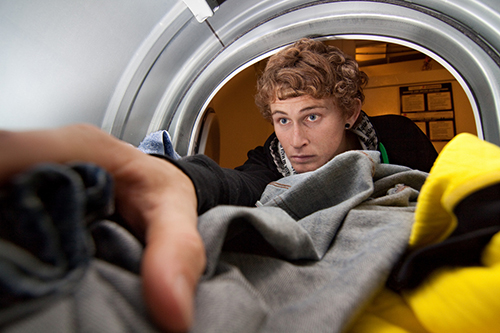
Before Residential Services began offering free laundry to all students living on campus, I didn't think anything could motivate college students to do their laundry more frequently than they had to.
Executive Director of Residential Services Paul Riel said the free laundry idea came from conversations with other institutions and on-campus leadership groups like the Residence Hall Association and Residential College Board about amenities on-campus students might enjoy.
While free laundry has the potential to lead to a better-smelling campus and fewer quarter-saving students, it could also lead to environmentally unfriendly behavior. The machines in my dorm seem to be working around the clock, or at least more so than last year, and the loads seem to be growing smaller and smaller.
“I think the idea behind free laundry is to allow [students] more opportunities to do laundry when they need to do it,” Riel said, “rather than having them schedule it around when they have money.”
It’s true. Spending two dollars a week on laundry can add up, especially on top of all the hidden costs of college not included in the sticker price. Northwestern estimates the average student’s personal expenses (on top of tuition and not including books) for the current academic year are $1,965.
With the cost of laundry no longer a barrier, students don’t have to hold out until they run out of underwear to do their laundry. That explains the increased machine usage I’ve observed in my residential college, but it doesn’t entirely justify the smaller loads I’ve seen going in fairly regularly.
From an environmental standpoint, it’s frustrating to think that 25-40 gallons of water went to washing two articles of clothing. Northwestern’s dorms are equipped with high-efficiency washing machines that hold more clothes and use less water, but that doesn’t really matter if we use them more often. Get it together guys; it’s Green Cup.
It’s also frustrating to wait 40 minutes because someone took up all the machines by stringently following all the laundry rules and separating one load into darks and lights, and sheets and towels. Laundry is an amenity that should be enjoyed by all those who live on campus, and no one should have to resort to doing laundry at 3 a.m. to beat the crowds.
However, there’s no way to know that the rate at which students do laundry has increased for sure. There’s no easy way for Residential Services to track machine usage since students no longer have to swipe their ID cards or insert quarters to use them.
The cost of doing laundry, though not as insurmountable as stairs leading to the basement laundry room (or if you’re lucky, the jaunt down the hall), might have made students think harder about how much they’d get out of a cycle and two dollars. For example, students may have been more willing to commit laundry crimes (lint be damned), wash items after multiple wears or just wait until a full load accumulated before hitting the machines.
But since cost is no longer the deciding factor in whether to be environmentally friendly, it’s up to students to police their own laundry habits and not only sustain Northwestern but let others enjoy the amenities as well.